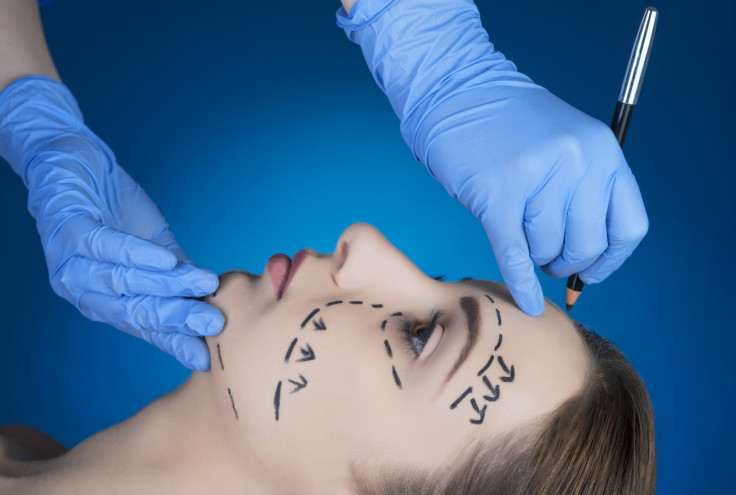How does the rise of cosmetic procedures through social media impact body image?
Social media can already have a negative impact on body image, but the rise of cosmetic surgeries on the internet poses the risk of warping beauty perceptions.

If you're a chronic social media consumer like me, then you're probably kept up-to-date with the newest fashion trends, celebrity gossip and baroque accessories, all battling to share the limelight.
In between scrolling through the wholesome posts of your family and friends, you're most likely every now and then to stumble across the odd post from a celebrity, influencer or an immaculate model advertising the latest beauty product or cosmetic surgery.
Whilst scrolling through Instagram the other day and witnessing these kinds of posts from celebrities, influencers and beauty product promoters myself, I made a sudden and rather random observation – everyone kind of looks the same. What with all the slim noses, sharp jawlines, protruding cheekbones, plumped lips, rock-solid hairlines, straight white teeth and perfectly symmetrical faces, everyone kind of looks – well, perfect. Those deceiving filters don't exactly help matters either, but without sounding hypocritical, I'm guilty of using them to make my photos look more attractive.
Now I know the term "perfection" is subjective and even commonly likened to being a myth, but what I mean by the term, in this case, is that these people literally looked faultless in their beauty and without even the most minute of abnormalities. I even found myself staring at my own reflection in the mirror several times, evaluating my own face and body, and picking out the things that didn't look right. I was comparing myself to these incandescent models and was hit with the reality that I couldn't hold a candle to them.
It made me feel insecure and unhappy with my appearance.
In recent years, there has been a rapid increase in plastic surgery and cosmetic procedures, with the United States carrying out more surgeries than any other country. Facial procedures are shown to be the most common of these procedures, with a huge increase of 55 per cent in 2021. It's standard knowledge that ageing is a way of nature and just something that cannot be avoided, no matter how hard we try and regardless of how rich we are.

But many people, understandably as well as obsessively, want to preserve their youth for as long as possible. No one wants to grow old and wrinkled and grey. That's why it's no wonder that in 2019, nearly 40 per cent of cosmetic procedures were performed on people aged 38 to 50, most likely because they wished to maintain their youthful appearances. Like the titular protagonist in Oscar Wilde's The Picture of Dorian Gray, we really would do anything to look young and beautiful forever – perhaps even sell our souls for the privilege.
Cosmetic surgeries have now become normalised and long past the days of taboo, and this is due to how people, including celebrities and influencers, now openly discuss the benefits of these procedures. Numerous celebrities have even publicly spoken about the procedures they have undergone, whether it be focused on a newfound sense of pride, or even regret.
Personally, I think it's a good thing that the world has become comfortable with discussing these topics and that such procedures can help people feel empowered in their own skin. However, I cannot deny the fact that the prevalence of cosmetic surgery has become, frankly, overwhelming, and the unremitting presence of "perfect" looking people on online platforms can harmfully impact the body image and self-esteem of their audience.
According to a paper published on ScienceDirect, which involved analysing the relationship between social media and body image, it was a common factor for Facebook users, particularly teenage girls, to frequently compare their bodies, prioritise getting thinner and internalise the thin-ideal more than non-users. The research also showed that people who spent more time on Facebook experienced higher levels of body dissatisfaction. This study concluded that the use of social media was indeed associated with body image concerns, particularly if the users kept comparing their own appearance to others.
This kind of concern over body image can lead to a multitude of serious problems ranging from low self-esteem, social anxiety, depression and disordered eating. To expand on the latter further, a study carried out by Verywell Mind found a distinct correlation between disordered eating, negative body image and frequent use of social media. Ostensibly, the correlation was stronger when the participants were scrolling through content relating to body image and appearance, likely from models and fitness instructors.
From my own experience, I see countless guys, online and in real life, who are theoretically more good-looking and well-built than my skinny physique, and it makes me feel somewhat inferior. I've even had people tell me that I need to work out and build some muscle because it'll make me look "proportionate" with the rest of my body, due to my tall height.
The way I see it, bodies come in all shapes and sizes. And as Dr Touroni puts it: "As we know, body types mostly come down to genetics. We need to chip away at this concept of the 'perfect body' and focus on other more meaningful, important qualities instead. We want to be encouraging a relationship with our bodies that is loving and accepting, and focused on health and balance rather than perfection."
In a world where social media is always showing us something better, cooler, more relevant, sexier, more beautiful, more attractive and more "perfect," it's no wonder that we've become so paranoid about our bodies and physical appearance. Our perception of beauty has been warped by faultless portraits of people who perhaps once felt deeply unhappy in their own skin and desperately sought to become more "attractive" by society's standards.
There is absolutely nothing wrong with doing the things that you feel make you more attractive and comfortable in your own skin, not in the slightest. But when we're constantly questioning our reflection and trying to make ourselves more attractive through cosmetic surgery, exercise and weight loss because we never truly feel happy with how we look in the mirror – when does it end?
© Copyright IBTimes 2025. All rights reserved.






















